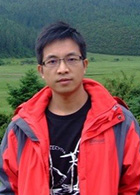![]()
Chao-Sheng Tang was born in Hengyang, Hunan Province in October 1980. He is currently a Professor and Director of Geological Engineering Division at School of Earth Sciences and Engineering, Nanjing University. He is Distinguished Young Scholar by National Natural Science Foundation of China (NSFC), Chang Jiang Scholar (Young Scholar) by Ministry of Education, Excellent Young Scholar by NSFC, and Deputy Director of Advanced Computational Engineering Institute for Earth Environment (ACEI). He received Bachelor from China University of Geosciences (Wuhan) in 2003, and Ph.D. from Nanjing University in 2008. He was visiting scholar of University of Cambridge and Ecole des Ponts ParisTech from 2014 to 2016.
His research has been focused on extreme climate engineering geology and urban geoenvironmental engineering. He was awarded the 1st class Prize of the State Science and Technology Advancement as a main contributor, the only nominee in Asia for the 2012 Richard-Wolters Award of the International Association of Engineering Geology and Environment (IAEG), awarded the Golden Hammer Prize for Young Geologist by Geological Society of China and the Gu Dezhen Youth Science and Technology Prize by Engineering Geology Committee of China. Up to now, he has published more than 150 papers, including 13 papers in Engineering Geology as first or corresponding author. He authorizes 7 China National patents. He is the President of Youth Committee of Engineering Geology in China, and Editorial Board Member of Canadian Geotechnical Journal, Environmental Geotechnics and Geoenvironmental Disasters.
Disaster formation process of engineering soils and countermeasures related to extreme drought climate
Due to global climate change, extreme drought climate events have occurred frequently in recent years, causing a series of environmental engineering geological problems or disasters, which have a profound impact on national economic and sustainable social development, and have brought many new challenges to current engineering geology research. Vigorously improving the ability to prevent and control natural disasters has a bearing on the national interest and people's livelihood. In recent years, Dr. Tang has conducted a systematic research on the disaster formation process of engineering soils and countermeasures related to extreme drought climate. He revealed soil moisture evaporation-shrinkage-cracking processes and their coupling behavior, and demonstrated soil engineering properties response characteristics and the spatial-temporal evolution laws of soil multiple field parameters such as thermal/hydro/stress/deformation/structure. He established a theoretical model of atmospheric-soil interaction, created a method for studying soil cracking, and developed a series of novel soil improvement and drought-resistant technologies based on physical, chemical, and biological principles. He also developed distributed optical fiber monitoring technology for soil deformation, which is capable of warning disaster. His work makes up for the lack of research on extreme drought induced disasters in the field of engineering geology, and has important theoretical and practical significance for improving the engineering geological community's decision-making ability to respond to extreme drought climate events and enhancing comprehensive disaster prevention and mitigation capabilities. It should be noted that some of the achievements have been successfully applied in a number of important projects, and significant social and economic benefits have been achieved. Moreover, the findings related to drought climate-soil interaction are valuable for the study in agriculture, soil science, environment, ecology and other related disciplines.

